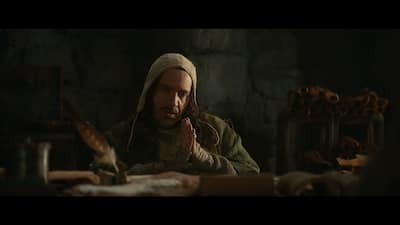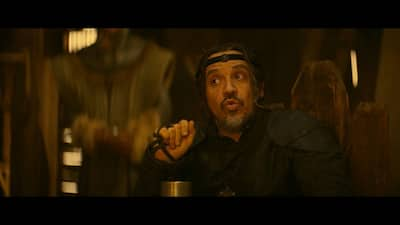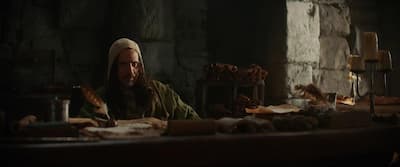Alexandre Astier returns to cinema with his Camelot: Part Two, Part 1the highly anticipated film, which opens this Friday in Quebec. Twenty years after the release of the first episode of the television series. Caamelott is a cultural phenomenon, and the 51-year-old director shares his analysis of an industry in complete transformation.
Following the fall of Caamelotte and the rise of Lancelot (Thomas Cousso), who imposes his tyrannical rule on Great Britain, Arthur Pendragon (Alexandre Astier) is a deposed king, frozen in his castle and demoralized. The plot involves the return of such key figures as the eternal complainer, now the king of Carmelida, Leodagan (Lionel Astier) and the knight Caradoc (Jean-Christophe Humbert). On the other hand, in this first part the emblematic character of Perceval de Galle (Franck Pitiot) is missing, a choice justified by Alexandre Astier for reasons of the script, but we find Christian Clavier, Guillaume Gallien and Alain Chabat.
“I want to tell simple stories that everyone can understand,” Alexandre Astier tells us at the beginning of the interview. Indeed, it is a saga and therefore there is continuity.
Because in 20 years, the creator of this special gaming universe of the Arthurian legend has been able to create what he calls an “institution.” But, he emphasizes, “if this is an institution, then there is no “generation.” Caamelott”. Except, Caamelott changed his face so often, even gradually, that I don’t know if he can really please the same people all the time.”
Far from genres…
While the previous feature film was released five years ago, at the height of a pandemic, this one is released at a time of deep global upheaval. And at the same time, Alexandre Astier takes advantage of this. Camelot: part two, part 1 as a contemplative prelude to the second part (scheduled for November 2026), including the use of special effects from that film, which had a budget of 38 million euros (approximately 62 million Canadian dollars).
“I try not to be categorized by gender,” he emphasizes. In my position it is very difficult, because I have nothing against the word “comedy”. The word “comedy” is one of the most beautiful words in the world. But on the other hand, I find its cataloging meaning to be very simplistic. In France, in any case, comedy involves a whole set of rules, restrictions that do not interest me at all, including in terms of duration. There are a lot of things like that that don't interest me. So, I try not to have a gender. And if I try not to have a genre, I believe that I'm not aiming for the genre of action film, sensational film, effects film, or comedy.
“I only use special effects because I need them to tell a story, to show something,” he adds. I really appreciate, for example, in special effects, when it comes to a character, that it's shot as if he was actually there. That's it, don't make an event out of it. This is not a special effects scene. They can be used to do very stupid things, to show something that wouldn't be possible just by including it among the others. But I don’t have scenes of courage, as genre cinemas offer, at least in the plural. I'm trying to tell a story using all the tools at my disposal, but without making a big deal about it.”
Freedom to create…
Writing this double feature (both parts were filmed at the same time) was also not an easy task, “very technical, quite heavy.” He spent “eight months filming, crossing four seasons and multiple countries, directing nearly 80 actors and actresses.” He compares writing the two feature films to “making intersecting short films” where the characters “don't necessarily overlap, but they all have to tell the same story.”
If he defines himself as a “dirty boy,” he argues that change is part of his approach. “The whole point of watching what happens 20 years later is that it changes as the guy doing it gets older. If it stayed stable, it would be weird.”
“In order to make compromises, you also need to be able to allow them. And first of all, what is the benefit of compromises, for whom, in what direction?” he answers the question whether in 20 years there will be Caamelotthe had already had to make certain adjustments.
“I don’t believe in marketing analysis, knowing that someone will want to explain to me who I’m talking to when I do Caamelott. I make films for people who come to see them and enjoy them. Caamelott. I believe that the cinema queue has everything. Where marketing would like to group, form groups, goals, I, on the contrary, dissociate. I believe that grandparents who take their 12 year old granddaughter to see a movie, or a group of friends who come to see it as a threesome, and someone who knows very well Caamelott and who takes someone who doesn’t know him at all… I display on the screen what I would like to see there, that’s all. In my opinion, this is what everyone should do.”
And he adds that he should not give in to nostalgia. “I'm not nostalgic for Caamelott. I’m not here to do what I did 20 years ago.”
The actor admits that his freedom is constantly threatened by the demands of the film industry. Making films of this magnitude is like “getting married to the industry every now and then.” The challenge is to maintain your freedom in a world that has become “industrialized” as films require large budgets. “Coluche said, 'We're worth what we bring.' It's sad, of course, it's cruel, a little cruel, but that's life. At this point, I bring enough to not be… People still listen to me, they trust me and give me money to make films.”
As for the future, Alexandre Astier is aware that the end of this part is “a little dry” and that there is a “long intermission” before the release of the second part. Despite everything, there is an idea for a third part. “There are three options, certainly, there are three that can be said. Without a doubt.” But first he needs to work on post-production and orchestration of the film, which is due for release in November 2026. And he concludes: “The challenge is to maintain your freedom in a world that is becoming industrial.”
Camelot: part two, part 1 in cinemas from October 24.











